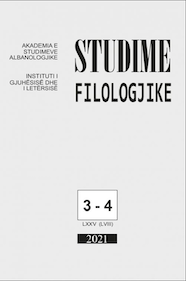Evolucioni i mesazhit dhe i formës në krijimet rinore të De Radës deri te “Këngët e Milosaos”
Evolution of Form and Message in De Rada's Early Writings and in “Songs of Milosao”
Author(s): Klara KodraSubject(s): Studies of Literature, Albanian Literature
Published by: Qendra e Studimeve Albanologjike
Keywords: De Rada; "Songs of Milosao"; evolution form; message;
Summary/Abstract: In the article “Evolution of form and message in De Rada's early writings and in ‘Songs of Milosao’” are presented basic issues related to De Rada's creativity. Is "Milosao" a masterpiece of the Arbëreshë and Albanian literature? Has it reached the European level? What reasons determined its values? Was this work the result of a creative step or an evolution? The study attempts to give answers to these questions and others, relying also on the discovery and publication, thanks to the work of Arbëresh researchers of Cosenza, of pre-Milosai variants as well as on the manuscripts of young creations kept by the State Archive or various libraries in Italy. The study also raises the question of the message that "The songs of Milosao" brought and its literalness, aiming for a rereading of the text as objectively as possible. In particular, theses of various researchers are presented, supporting or opposing them and aiming for an in depth analysis. Controversial issues are also raised, like the identification of a certain poem such as "The Exiled of Kruja", an issue that cannot be given a final answer, but efforts are made to put on a thesis. The aim of the study is to avoid ideological and nationalist boundaries for the sake of scientific objectivity. In conclusion, it is accepted that "Milosao" was the fruit of a creative stage, but also of an evolution; as it was a masterpiece from which De Rada became the founder of a new literature related to European romanticism, as well as a precursor of new directions, creator of a new poetic language that would start with "Milosao" and be extended in other works. It is also claimed that De Rada was a poet of European level. This level would be accepted by various contemporary intellectuals, but it would not find a concrete echo in the European consciousness due to the language barrier and the geographical smallness of his nation.
Journal: Studime Filologjike
- Issue Year: 2021
- Issue No: 03-04
- Page Range: 61-79
- Page Count: 19
- Language: Albanian

